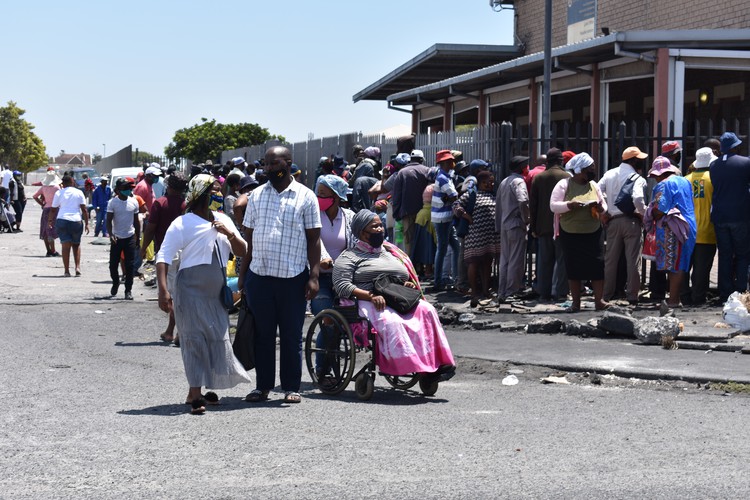Activists call for a task team to find ways to boost Covid grant
Social protection provides a lifeline but it’s not enough, say researchers
A social grants queue in Gugulethu, Cape Town. South Africa can afford to increase the R350-a-month Social Relief of Distress grant to the poverty line of R624, says the Black Sash. Achive photo: Buziwe Nocuze
The Black Sash has called on the government to set up a task team to work out how to increase the R350-a-month Covid Social Relief of Distress (SRD) grant to the food poverty line of R624.
Speaking at the launch of a research report on social protection, Black Sash national director Rachel Bukasa said: “Government tends to hide behind the fiscal argument and doesn’t want to engage. They need to put researchers, economists, people from civil society and other roleplayers in a room, and have them show how this can be made affordable.”
“As civil society, we are saying we can afford it and we can show you how we can afford it. So why aren’t you prepared to listen?” said Bukasa.
The report, released by the Black Sash and the Human Sciences Research Council, looked at the current policy framework and delivery of social grants.
The researchers called on the government to develop a policy framework that directly addresses structural inequality and injustice instead of only providing a “safety net” for the most vulnerable. They said the current social assistance system only offered “economic protection” instead of social protection and served “as a bandage intended to alleviate the extremes of poverty and unemployment”.
Bukasa said permanent Basic Income Support (BIS) for people aged 18 to 59 years who have little to no income was necessary as “a key component of a social protection floor”. But, she said, it was just the beginning of “developing a transformative social protection system”.
The researchers interviewed 19 applicants for the SRD grant. Participants said they had not had enough food during the lockdown and had to skip meals; more than half said they had to borrow money for food. They also cited problems with connectivity and the cost of data when trying to apply for the grant online.
Participants who received the grant money through their bank said it was more convenient than going through the Post Office and they were willing to accept the bank charges involved. Those who received their grant through the Post Office complained of long queues and delays. Participants sometimes left their homes between 3am and 6am to travel to a post office and secure a spot in the collection line.
“Yet, an early arrival does not mean early receipt of money, as participants spent several hours waiting to be helped,” the researchers said.
Support independent journalism
Donate using Payfast

Don't miss out on the latest news
We respect your privacy, and promise we won't spam you.
Next: Makhaza might wait another four years for promised police station
Previous: Expiry of judges’ contracts delays fight against corruption
© 2022 GroundUp. This article is licensed under a Creative Commons Attribution-NoDerivatives 4.0 International License.
You may republish this article, so long as you credit the authors and GroundUp, and do not change the text. Please include a link back to the original article.
We put an invisible pixel in the article so that we can count traffic to republishers. All analytics tools are solely on our servers. We do not give our logs to any third party. Logs are deleted after two weeks. We do not use any IP address identifying information except to count regional traffic. We are solely interested in counting hits, not tracking users. If you republish, please do not delete the invisible pixel.

